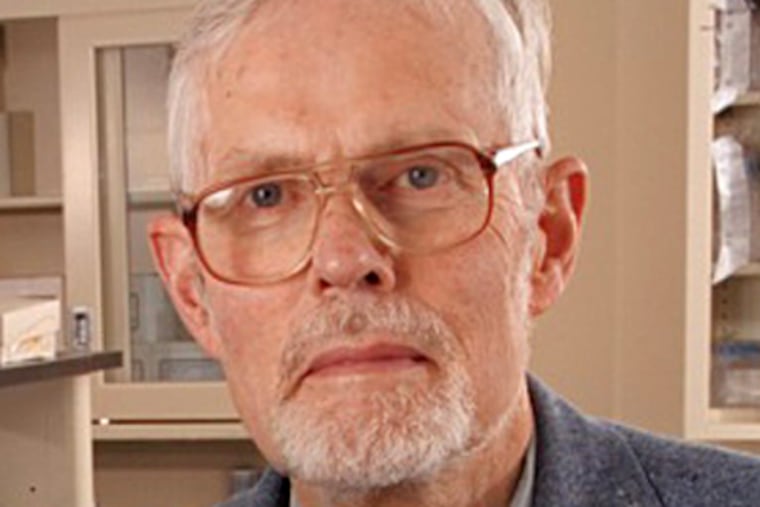H Fred Clark, 75, social activist, vaccine researcher
H Fred Clark, 75, of Center City, a social activist who was one of a trio of Philadelphia scientists whose work on the rotavirus vaccine is credited with saving children’s lives worldwide since 2006, died of complications from heart and Parkinson’s diseases Saturday, April 28, at Penn Presbyterian Medical Center. The target of the vaccine was rotavirus, “a cause of fever, vomiting and diarrhea and dehydration in young children,” said Dr. Paul Offit, who along with Dr. Stanley Plotkin, formed the trio.

H Fred Clark, 75, of Center City, a social activist who was one of a trio of Philadelphia scientists whose work on the rotavirus vaccine is credited with saving children's lives worldwide since 2006, died of complications from heart and Parkinson's diseases Saturday, April 28, at Penn Presbyterian Medical Center.
The target of the vaccine was rotavirus, "a cause of fever, vomiting and diarrhea and dehydration in young children," said Dr. Paul Offit, who along with Dr. Stanley Plotkin, formed the trio.
"All children are ... infected by it," Offit said in a Wednesday interview. In this country, "prior to the vaccine it caused about 70,000 hospitalizations and 60 deaths a year."
But worse, Offit added, "in the world the virus kills about 500,000 children a year. So therefore about 2,000 children die a day from this virus.
"The status of sanitation in the home or country is not relevant. The reason children died in the developing world" from rotavirus, he said, "is medical access is poorer and they're less well-nourished."
Of his colleague, Offit noted: "I saw Fred for 30 years almost every day. I was really impressed by his judgment, his passion, his common sense, and his devotion to those less fortunate than himself."
Alan Cohen, physician-in-chief at Children's Hospital of Philadelphia, wrote in a statement to colleagues about Dr. Clark's significance as a research professor of pediatrics at Children's and at the University of Pennsylvania Medical School:
"Children's Hospital recognized Dr. Clark in 2006 with its highest honor, the Gold Medal, which is awarded to those who have had a profound impact on children's health in the United States and worldwide.
"The medal saluted Dr. Clark's achievements as a coinventor of the rotavirus vaccine, RotaTeq," along with Offit and Plotkin. "The three scientists carried out laboratory studies of the vaccine between 1980 and 1991 at Children's Hospital and the Wistar Institute. Today, the vaccine they invented saves the lives of hundreds of thousands of children across our planet."
In his interview, Dr. Offit explained that "in collaboration with Merck the vaccine was developed, starting around 1990, to 2006," when finally "it was licensed by the Food and Drug Administration and recommended by the Centers for Disease Control and Prevention. ...
"It's a slow, tough process."
In a Thursday interview, Dr. Clark's wife, Karen, said her husband "was committed to social justice, as important to him as his scientific research."
In the 1970s, she said, he joined the Philadelphia chapter of Common Cause and helped to "advocate for a fair police complaint procedure." In the 1980s, "he was a peace activist, very involved in the work to prevent the proliferation of nuclear weapons."
After he and his wife joined the First United Methodist Church of Germantown, she said, they became part of "a parish-twinning program with a peasant association" in the Haitian town of Fondwa.
The Roman Catholic parish priest there developed "a micro-credit-lending bank," she said, "to enable poor women to become entrepreneurs and create businesses. Fred was the first American supporter of that bank and it remained a great love of his."
Born in Buffalo, N.Y., Dr. Clark graduated from what was then the New York State Veterinary College of Cornell University in 1960 and earned a doctorate in microbiology and immunology at the State University of New York at Buffalo in 1967.
After joining the Wistar Institute in 1968 and working as an associate professor there from 1972 to 1992, he was a member of the Graduate Group in Microbiology at the University of Pennsylvania from 1978 to 1997, becoming research professor of pediatrics at Penn's School of Medicine in 1992.
Offit said that in the Clark-Offit-Poltkin trio, "we all brought something different to the table."
"Fred is a vet and Ph.D., I'm a pediatrician and also a virologist and immunologist, and Stanley had developed another vaccine, so he helped us figure out what one had to do."
At the heart of the vaccine, Offit said, is a strain of rotavirus in cattle that Dr. Clark isolated at the New Bolton Center of the Penn School of Veterinary Medicine near Kennett Square.
"The hope was that just the cow strain would be a vaccine, but that didn't work out," he said. "So we needed to make the cow strain more humanlike." And that, he said, took time.
Offit said that he is now the chief of the division of infectious diseases at Children's and that Plotkin is a consultant to vaccine manufacturers.
Besides his wife, Dr. Clark is survived by son Christopher; daughters Melanie Spagnoli and Marianne Vitiello; stepson Peter Don Konics, stepdaughters Alexandra Don Konics and Elisabeth Sharp; a sister; 10 grandchildren; and former wife Mimi Rice.
A memorial service is set for 2 p.m. Sunday, May 6, at the First United Methodist Church of Germantown, 6023 Germantown Ave., with a reception to follow. Interment is private.
Donations may be sent to the Parkinson Creative Collective, Inc., c/o Pamela Kell, 6 Portland Rd., Little Rock, Ark. 72212.
Contact Walter F. Naedele at 215-854-5607 or wnaedele@phillynews.com.